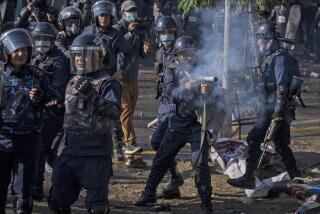Nepal’s King Offers Concession; Protesters Unmoved
- Share via
KATMANDU, Nepal — After two weeks of violent protests, Nepal’s King Gyanendra said Friday that he would shift executive power to a prime minister. But the largest opposition party said he had not gone far enough and promised more demonstrations.
At least 12 people have been killed and hundreds wounded in police action against protesters since a seven-party alliance launched a campaign April 6 to demand restoration of multi-party democracy.
Gyanendra sought to ease the crisis Friday, announcing in a national address that he would give the alliance the power to name a prime minister.
“Executive power of the kingdom of Nepal, which was in our safekeeping, shall from this day be returned to the people,” the king said.
“We ask the seven-party alliance to recommend the name for the post of prime minister at the earliest for the constitution of a council of ministers, which will bear the responsibility of governing the country in accordance with the constitution.”
The king, never an electrifying public speaker, looked particularly uncomfortable during the speech, which was broadcast on state television and radio. He appeared frozen in front of a cloth backdrop, staring directly into the camera as he spoke.
Gyanendra appeared to rule out any change of the constitution to curb his own powers, which has been a primary demand of opposition parties. They have called for the election of a constituent assembly to reform the political system. Most opposition leaders want a constitution that would make the king a ceremonial figure or eliminate the monarchy entirely.
Under the plan announced Friday, the king also would retain an undefined political role in a constitutional monarchy and apparently keep control of the military.
Krishna Prasad Sitaula, a spokesman for the Nepali Congress, a key constituent of the alliance, said the king had not “addressed the road map of the protest movement.”
“Our protest campaign will continue,” he said.
The parties were to give a joint response, possibly today.
Gyanendra sacked the government and took full powers in February 2005, vowing to crush a decade-old Maoist revolt in which more than 13,000 people have died.
The Maoist rebels, who have loose ties to the seven-party alliance, have insisted on a new constitution prepared by a constituent assembly as a precondition to joining the mainstream.
Gyanendra, who came to the throne after the 2001 palace massacre in which his elder brother, Birendra, was killed by his own son, the Crown Prince Dipendra, has been under international pressure to restore democracy.
The European Union and India welcomed the king’s pledge to hand over power.
U.S. Ambassador James Moriarty, speaking to Reuters Television two hours before the address, said the king had no choice but to relent to the parties’ demands.
“If he doesn’t do that, I think the monarchy will not last and ... we are going to see a revolution inside Nepal.”
On Friday, protesters burned tires and threw logs and barbed wire across the streets of Katmandu, the capital, as a curfew imposed to prevent a march on the palace took effect.
Black smoke rose from several places in the city of 1.5 million people as demonstrators tried to block movement of police and troops. Protesters set fire to a government revenue office on the outskirts of the capital and battled with police elsewhere in the city. There was no word of serious casualties.
More to Read
Sign up for Essential California
The most important California stories and recommendations in your inbox every morning.
You may occasionally receive promotional content from the Los Angeles Times.













